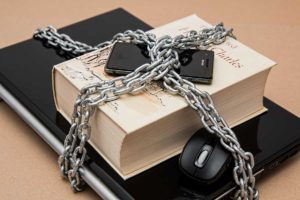Identity theft occurs when someone uses your personally identifying information, like your name, Social Security number, or credit card number, without your permission, to commit fraud or other crimes.
Identity theft is serious. It can cost you time and money. It can destroy your credit and ruin your good name.
Skilled identity thieves use a variety of methods to steal your personal information, including:
- Dumpster Diving. They rummage through trash looking for bills or other paper with your personal information on it.
- Skimming. They steal credit/debit card numbers by using a special storage device when processing your card.
- Phishing. They pretend to be financial institutions or companies and send spam or pop-up messages to get you to reveal your personal information.
- Changing Your Address. They divert your billing statements to another location by completing a “change of address” form.
- “Old-Fashioned” Stealing. They steal wallets and purses; mail, including bank and credit card statements; pre-approved credit offers; and new checks or tax information. They steal personnel records from their employers, or bribe employees who have access.
So, what can you do?
Deter identity thieves by safeguarding your information.
-Shred financial documents and paperwork with personal information before you discard them.
-Protect your Social Security number. Don’t carry your Social Security card in your wallet or write your Social Security number on a check. Give it out only if absolutely necessary or ask to use another identifier.
-Don’t give out personal information on the phone, through the mail, or over the Internet unless you know who you are dealing with.
-Never click on links sent in unsolicited emails; instead, type in a web address you know. Use firewalls, anti-spyware, and anti-virus software to protect your home computer; keep them up-to-date.
-Don’t use an obvious password like your birth date, your mother’s maiden name, or the last four digits of your Social Security number.
-Keep your personal information in a secure place at home, especially if you have roommates, employ outside help, or are having work done in your home.
Detect suspicious activity by routinely monitoring your financial accounts and billing statements.
Be alert for:
-Bills that do not arrive as expected
-Unexpected credit cards or account statements
-Denials of credit for no apparent reason
-Calls or letters about purchases you did not make
Inspect:
-Your credit report. Credit reports contain information about you, including what accounts you have an your bill paying history. Under federal law, you are entitled to a free credit report each year from each of the three main credit bureaus: Equifax, Experian, and TransUnion. Visit www.AnnualCreditReport.com to ask for a copy.
-Your financial statements. Review financial accounts and billing statements regularly, looking for charges you did not make.
If you suspect identity theft:
- Contact the fraud deportments of each of the three major credit bureaus. Tell them to flag your file with a fraud alert including a statement that creditors should get your permission before opening any new accounts in your name. In a few months, order new copies of your reports to verify your corrections and changes, and to make sure no new fraudulent activity has occurred.
- Contact the creditors and tell them if your account has been tampered with or opened fraudulently. Ask to speak with someone in the security or fraud department. After your conversation, follow up in writing. Its required by the Fair Credit Billing Act for resolving errors on credit billing statements, including charges that you have not made.
- File a report with your local police or the police in the community where the identity theft took place. Keep a copy in case your creditors need proof of the crime.
- Report the theft to the Federal Trade Commission. Your report helps law enforcement officials across he country in their investigations. Visit ftc.gov/idtheft.
Armed with the knowledge of how to protect yourself and take action, you can make identity thieves’ jobs much more difficult. You can also help fight identity theft by educating your friends, family, and members of your community.
 Protect Yourself from Tax-Related Identity Theft Before it is Too Late
Protect Yourself from Tax-Related Identity Theft Before it is Too Late  Guarding Against IRS and Social Security Scams
Guarding Against IRS and Social Security Scams  Don’t let thieves steal your personal health information
Don’t let thieves steal your personal health information  Be In The Know: 22% of Students Fall Victim to Identity Theft
Be In The Know: 22% of Students Fall Victim to Identity Theft 

